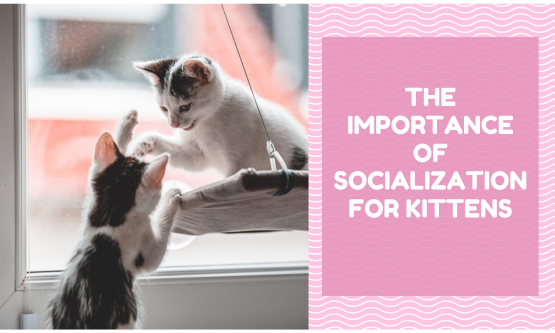Socialization is a crucial part of raising a well-adjusted, confident, and happy kitten. During the early stages of life, kittens learn how to interact with humans, other animals, and their environment. Proper socialization helps kittens develop the skills they need to adapt to new situations and form positive relationships.
Here’s why socialization is so important for kittens:
1. Critical Socialization Period
- When: The critical window for socialization typically occurs between 2 to 7 weeks of age. During this time, kittens are most receptive to new experiences, and the interactions they have will shape their behavior for life.
- Why It’s Important: Kittens exposed to a variety of people, animals, and environments during this period are more likely to grow into friendly, confident, and well-adjusted adult cats. If this window is missed, kittens may become fearful or anxious around new stimuli.
2. Reducing Fear and Anxiety
- How It Helps: A well-socialized kitten is less likely to be fearful of new people, sounds, or environments. Introducing kittens to different stimuli, such as various types of sounds, textures, and household items, helps them develop confidence and reduces anxiety later in life.
- What to Do: Gradually expose your kitten to different environments and people in a controlled and positive way. This includes exposure to children, men, women, and even unfamiliar noises like the vacuum cleaner or television.
3. Developing Positive Human Interaction
- How It Helps: Socialized kittens are more comfortable around humans, leading to stronger bonds with their owners. Kittens that are handled gently and consistently by humans during their early weeks are more likely to enjoy being petted, held, and interacted with as adults.
- What to Do: Regularly handle your kitten, including petting, holding, and even gently touching their paws, ears, and mouth. This will help them become accustomed to handling and make future grooming and vet visits easier.
4. Encouraging Play and Exercise
- How It Helps: Play is a key part of socialization that helps kittens develop coordination, strength, and social skills. It also satisfies their natural hunting instincts in a safe and appropriate way.
- What to Do: Engage your kitten in interactive play with toys like feather wands or balls. Playtime with other kittens or cats also helps them learn appropriate behaviors, such as how to use their claws gently and not bite too hard.
5. Learning Appropriate Behaviors
- How It Helps: Kittens that are socialized with other cats and animals learn important social cues and boundaries. For example, kittens learn how to play without being too aggressive, how to read other cats’ body language, and how to respect other animals’ space.
- What to Do: If possible, allow your kitten to interact with other friendly cats or pets in a supervised environment. This can help them learn valuable social behaviors, such as how to greet other animals and engage in play without causing harm.
6. Preventing Aggression
- How It Helps: Kittens that are properly socialized are less likely to develop aggressive behaviors toward humans or other animals. Socialization helps them understand that people and other animals are not threats, reducing the likelihood of fear-based aggression.
- What to Do: Positive reinforcement and exposure to a variety of gentle, non-threatening experiences will help prevent aggression. Avoid punishing or scaring your kitten, as this can cause fear and contribute to aggressive behaviors later in life.
7. Improving Adaptability
- How It Helps: Socialized kittens are more adaptable to changes in their environment, such as moving to a new home, meeting new people, or being introduced to other pets. This adaptability makes life less stressful for both the cat and the owner.
- What to Do: Introduce changes gradually and make them positive experiences. For example, reward your kitten with treats and praise when they meet new people or explore new spaces.
8. Better Health Outcomes
- How It Helps: Socialized kittens are typically easier to handle during vet visits, making medical care less stressful. Early handling of their paws and mouths can make nail trimming, dental care, and other procedures more manageable.
- What to Do: Get your kitten used to being touched in ways that mimic common vet procedures, such as having their paws touched or their mouths gently opened. Regular handling makes them more comfortable during check-ups and grooming sessions.
9. Building Trust
- How It Helps: Positive socialization helps build trust between your kitten and humans. Kittens that trust their humans are more likely to seek out affection, feel secure in their environment, and enjoy a stronger bond with their owners.
- What to Do: Use gentle, patient handling and positive reinforcement, such as treats and praise, to build trust with your kitten. Never force your kitten into situations that cause extreme fear, and always provide them with a safe space to retreat if they feel overwhelmed.
Conclusion:
Socializing your kitten is one of the most important steps in ensuring they grow into a well-adjusted, friendly, and confident adult cat. Early exposure to new people, animals, and environments, combined with positive reinforcement and gentle handling, helps kittens develop the skills they need to navigate the world comfortably. A well-socialized cat is happier, healthier, and easier to care for throughout their life.






